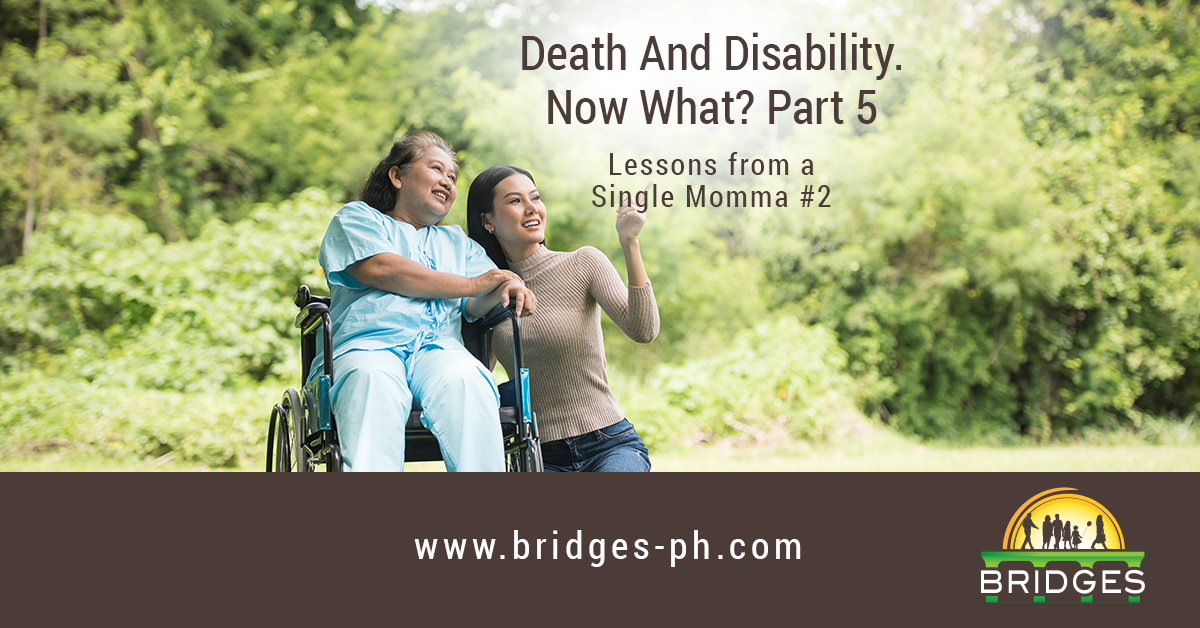
When preparing for death, you should never overlook the possibility of disabilities. There’s always a chance that instead of losing your life, a serious illness or injury puts you out of action. If that happens, you may no longer be able to support your family.
There are cases when disabilities prove costlier than death as you also become a dependent. Debilitating disabilities, for example, might make you reliant on others to help you through your daily activities. If your family can’t spare the time to be there for you, they might opt to hire a nurse or a personal aid. On top of that, you might also need to undergo rehabilitation therapy – if that’s still an option – and regular check-ups, to name a few. All these expenses can add up. And they add up quickly. When you factor in that you’re not earning an income, it can be financially disastrous for you and perhaps, your family.
That’s why when I revisited my estate plans recently, I once again asked myself: “What if I don’t die? What if I become disabled? What will happen to my kids?”
Disability
While the fear of these events actually happening continues to linger at the back of my mind, there are two reasons why I now feel more secure with my own preparations since I first put them in place:
One is because my kids are now much older; they can take care of themselves now; and are much less dependent on me.
I’ve already covered some of the bare essentials they’ll need to get themselves going in case something does happen to me. These include a house for them all to stay in and tuition fees of my two kids who are still studying, among others. Whatever else is left, like utility bills, I’m positive that they can pay for it themselves.
The other reason is that over the last couple of years I was able to build upon my initial preparations and strengthen its effectiveness. Much of what I said in my previous entry about the same topic remains true and is still my advice to many people working on similar plans.
I also carry a comprehensive healthcare plan, which strengthens my entire emergency plan. And it goes without saying how vital healthcare is for your financial security as it’s able to cover the immediate expenses of medical emergencies. But for more serious cases, healthcare won’t be enough. That’s where critical illness insurance comes in and fills that gap in your security.
Critical Illness Insurance
Critical illness is one of the leading causes of disabilities. As such, it’s smart to have insurance that covers these risks, which in a lot of cases can come out of nowhere.
You see, critical illness insurance provides you with a lump sum amount when you’re diagnosed with any of the covered illnesses. The money you claim can be used to cover your needs while you’re not working. That includes your own living expenses, in-home care, or other uncovered medical expenses. It takes a huge financial burden off of you and your family’s backs, letting you focus on what’s ahead, whether that’s recovery or making the most out of your last years.
I personally recommend keeping an eye out for policies that have the following features:
- Maturity of policy until age 100
- Provides coverage for critical illness until age 100
- Covers more than 100 critical illnesses
- Benefits involving hospital confinement
- Hospital income benefit
- Post hospitalization benefit
- Home recovery benefit
- Palliative care benefit
- Additional benefit related to specific cancer booster
- Withdrawable living benefits such as dividends and paid-up bonuses
- A guaranteed endowment benefit
Not all policies will have these features, so be sure to always weigh your options extensively.
Diversify Your Investments
Being rich in hard assets is not always practical. In emergencies it’s better to be liquid – to have cash on-hand that you can use to pay for whatever it is that you’ll need.
For this reason, I advise diversifying your investments. Don’t get me wrong, it’s good to have hard assets too. But these assets take time to be converted to cash. So they’re of no help when it comes to emergencies. As I said before, proper financial planning is about spreading your eggs in different baskets. Your financial portfolio should be well-rounded, covering all the bases of your needs.
If you’re preparing for these worst-case scenarios, you should have disability insurance. This type of insurance, like most other insurance policies, covers your financial needs against disabilities that might stop you from being able to work.
Disability insurance is not readily available in the country. However, there are self-insuring methods you can follow to fund your own protection policy. For more on that, you can refer to my previous article.
Remember, when preparing for disabilities, don’t dwell too much on what disability you might be afflicted with. After all, anything can happen, and there’s really no way to know for sure. Instead, consider the costs of becoming disabled; think of the possible needs you might have. That’s the best way for you to know if you’re prepared enough for what might be waiting around the corner.
Obviously, we wish we never have to deal with such events. I mean who does, right? But being prepared makes it a bit easier to overcome. And it goes without saying that there’s no better time to prepare than when you’re in good health and sound mind.
linkiNG you to opportunities,

photo from www.freepik.com
READ MORE:
- Death and Disability. Now what? Part 1 – Lessons from a Single Momma #2
- Death and Disability. Now what? Part 2 – Lessons from a Single Momma #2
- Death and Disability. Now what? Part 3 – Lessons from a Single Momma #2
- Death and Disability. Now what? Part 4 – Lessons from a Single Momma #2
- Staying Ahead of Life and Death Stakes During the Pandemic – Part 1
- Life Insurance: Preparing for the Inevitable
- Staying One Step Ahead of Disabilities That Can Put You Out of Action
- How You Can Secure Your Family’s Future From Life’s Uncertainties


